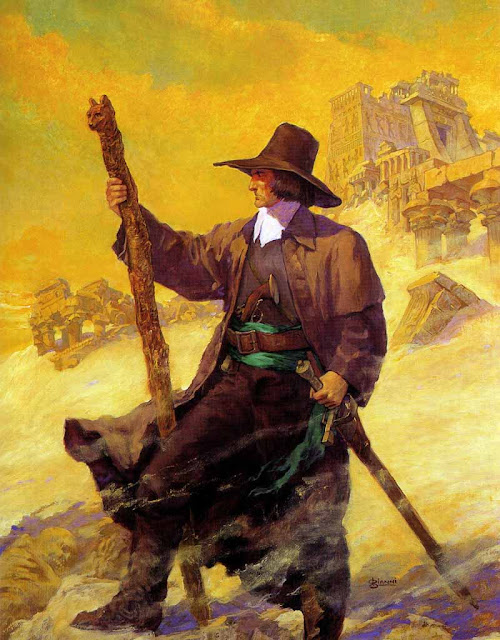Our Best Myth
Propers: Thanksgiving
Eve, A.D. 2018 B
Homily:
Lord, we pray for the preacher, for You know his sins are great.
Lord, we pray for the preacher, for You know his sins are great.
Grace, mercy and peace to you from God our Father and from
our Lord and Savior Jesus Christ. Amen.
It’s a myth, of course. The staid and stalwart Puritans, the
friendly noble Natives, the wide New World open and ready like a fresh canvas
laid out before us. The real history behind it all is messier, dirtier, and frankly
far more fascinating in its complexity. Everything about Thanksgiving and early
European settlement of the Americas defies easy expectation.
The Pilgrims were not racist imperialists. The Indians were
neither simple nor innocent. We shall find no Babes in Toyland here. What can
be said is that throughout the story of the founding of New England,
unimaginable suffering was endured by Native and settler alike. Bravery,
beauty, and what today seems superhuman resilience in the face of ghastly hardship
nevertheless emerged in the unlikeliest of places.
Half the Pilgrims died within a year. Some three-quarters or
more of the Indians had recently been wiped out by what appears to have been
Black Death. Plymouth was no virgin colony on wild soil. It was a ghost town
whose first inhabitants had all abruptly perished, save for Squanto and a
handful of survivors absorbed by neighboring tribes.
There were alliances, betrayals, wars, schemes, kindnesses,
and the sort of selfless hospitality that we would find shocking in its
generosity today. It led to 55 years of peace and prosperity—three generations
of White and Indian neighbors—before it all broke down in King Philip’s War.
This conflict again defies simple explanation. The Indian war-chief was a
baptized Christian.
So many mixed communities existed that people didn’t know
which side to take, or to which they of right belonged. King Philip’s War is
the bloodiest war per capita that we have ever fought. One third of all the
towns in New England were lost. And while we might classify this as a conflict
between two peoples, the truth is that it was more of a civil war than anything
else. The bonds we shared as Americans were so close that breaking them broke
everything.
Yet somehow, through a collection of historical coincidence
and purposeful mythmaking, the story of Plymouth has become our story of
national origin. We do not, as a nation, generally look to Jamestown, the older
English colony in Virginia. Nor do we look to the Spanish in Florida, the Dutch
in New York, or the French in Louisiana. We look to Plymouth. We look to the
Pilgrims.
And by and large, we appear to enjoy doing so. We love the
story, the characters. The little Mayflower braving the wild Atlantic. The
pious Pilgrims, the salty sailors, and the hard-nosed Strangers who made up the
bulk of the passengers. We love the notion of New England, now to us so quaint,
as someplace then mysterious, exciting, and new. We love the bravery of their
building, their stoicism in survival, and the firm simplicity of their guiding ideals.
And most of all we love the First Thanksgiving—which they
would not have called it—with its archetypal themes of hearth, home, family,
friends, abundance, simplicity, gratitude, graciousness, and bringing peoples
together over a celebratory meal. For one brief moment this community at
Plymouth encapsulated all the things we love about the American identity, all the
things we wish we were and want to be: faithful, industrious, prosperous, hard-working,
simple yet steadfast in our spirituality, generous, welcoming, loving,
striving, feasting, bringing together both natives and immigrants to
create a new society, a New World!
This is what we were meant to be, before wars hardened us,
wealth corrupted us, and ideologies rent us asunder. Before the Cold War, the
Civil War, World War II, before the Revolution itself, who were we? What were
we? What do we wish we could be once again?
We wish we could be Pilgrims. Adventurers. Explorers!
Practical and pious. Welcoming and hard-working. Taming the frontier and
building homes in which to raise our families and live in community. That’s our
heart. That’s our soul. Neither to serve nor to rule—that’s the American dream!
And we’re not all descended from Pilgrims. And frankly, the Pilgrims of history
often don’t live up to the myth, though in some ways they surpass it.
But that’s not what’s most important. We chose this holiday,
chose this myth, together, as a people, as Americans. We could’ve chosen other
myths but here’s the one that took. And we are still today proud of it,
thankful for it! This is who we want to be. And it doesn’t matter if you’re
Indian or White. It doesn’t matter if your ancestors were part of this story.
We’re all Finns and Norse and Germans here anyway. What matters is that we’re
part of the story now. We make it our own, make it ours.
It’s a funny little holiday, I do confess it so. It’s not
quite history and not quite myth. It’s not quite secular and not quite
religious. But by God, it is American, isn’t it? American as we were meant to
be, as we ought to be, as we hope to be again.
So let us live out these ideals today and in all the
generations ahead. Let us be explorers and Pilgrims and entrepreneurs. Let us
encounter new peoples and new civilizations. Let us be thankful for everything
we have. America used to want to be as a city upon the hill. Do we want that
still? Let us build something together, so that you and I and all of us are “We,
the People” again.
Let us be everything that Pilgrims ought to be. And let us
in all of this give thanks.
In the Name of the Father and of the +Son and of the Holy
Spirit. Amen.

Comments
Post a Comment